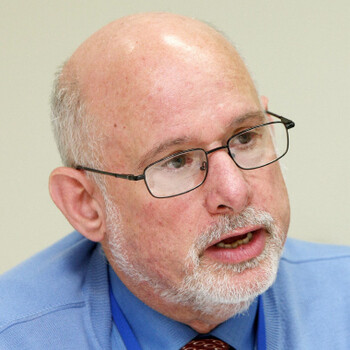hankyoreh
Links to other country sites 다른 나라 사이트 링크
Expert: dialogue with North Korea has brought gains

By Park Hyun, Washington correspondent
A former North Korea official in the US Department of State has a different view from Seoul and Washington’s argument that nothing has been gained from dialogue with Pyongyang.
The argument that previous talks have resulted only in South Korea and the US giving without getting anything in return has been used by the two governments to justify refraining from dialogue.
But Joel Wit, a former State Department official, told the Hankyoreh in a June 3 interview that the authorities in Seoul and Washington who claim North Korea’s pattern is to engage in provocative behavior in the hopes of being compensated “don’t know the history” of negotiations on the nuclear issue over the past 20 years.
According to Wit, both countries have made “substantive gains” from their talks with Pyongyang, including “a large reduction in the production of nuclear material and postponement of long-term missile tests.”
Wit also replied to South Korean Minister of Foreign Affairs Yun Byung-se’s recent comments that Seoul would “not pursue dialogue for the sake of dialogue.”
“They should try the dialogue route, and if North Korea isn’t sincere, they can just walk out,” Wit said, noting that North Korea would only be developing its nuclear capabilities further while authorities in Seoul and Washington continue shunning dialogue.
Wit, who contributed to Washington’s North Korea policy at the State Department between 1993 and 2002, participated in the 1994 Agreed Framework at Geneva - called a leading example of compensation to North Korea - and verification of suspected nuclear facilities at the village of Kumchang in 1998. He is also one of the founders of 38 North, a North Korean affairs website run by the US-Korea Institute at Johns Hopkins University.
Explaining the Agreed Framework, Wit said that North Korea had been “building facilities capable of producing as many as 100 nuclear weapons” at the time.
“As a result of those talks, it was only able to obtain the material to produce a handful of weapons by 2002,” he said.
He also commented that the few million US dollars in crude oil given by the US were “not much as compensation goes.”
Regarding the Kumchang situation, Wit blamed a US intelligence organization for leaking faulty information about facilities being present at a cave in the village.
“I led an inspection team of ten people there to look through the caves, but there was nothing,” he recalled.
Wit acknowledged that the US gave US$200 million in food to be able to look at the caves, but argued it was not accurate to say that North Korea engaged in provocations to win food aid.
“North Korea didn’t conduct any long-range missile tests for eight years because of the negotiated agreement to postpone them,” he said.
Commenting on the recent situation, Wit said Pyongyang and Washington were playing a “dangerous game” to win Beijing’s support.
“Many people were expecting [South Korean President] Park Geun-hye to come out with a new strategy at the summit [with US President Barack Obama], and she didn’t,” he noted. “She is tending toward the US view on things.”
“In the end, the question is going to be how effectively China is able to persuade the US and North Korea,” he concluded.
Please direct questions or comments to [english@hani.co.kr]

Editorial・opinion
![[Guest essay] The real reason Korea’s new right wants to dub Rhee a founding father [Guest essay] The real reason Korea’s new right wants to dub Rhee a founding father](https://flexible.img.hani.co.kr/flexible/normal/500/300/imgdb/original/2024/0423/8317138574257878.jpg) [Guest essay] The real reason Korea’s new right wants to dub Rhee a founding father
[Guest essay] The real reason Korea’s new right wants to dub Rhee a founding father![[Column] ‘Choson’: Is it time we start referring to N. Korea in its own terms? [Column] ‘Choson’: Is it time we start referring to N. Korea in its own terms?](https://flexible.img.hani.co.kr/flexible/normal/500/300/imgdb/original/2024/0423/3617138579390322.jpg) [Column] ‘Choson’: Is it time we start referring to N. Korea in its own terms?
[Column] ‘Choson’: Is it time we start referring to N. Korea in its own terms?- [Editorial] Japan’s rewriting of history with Korea has gone too far
- [Column] The president’s questionable capacity for dialogue
- [Column] Are chaebol firms just pizza pies for families to divvy up as they please?
- [Column] Has Korea, too, crossed the Rubicon on China?
- [Correspondent’s column] In Japan’s alliance with US, echoes of its past alliances with UK
- [Editorial] Does Yoon think the Korean public is wrong?
- [Editorial] As it bolsters its alliance with US, Japan must be accountable for past
- [Guest essay] Amending the Constitution is Yoon’s key to leaving office in public’s good graces
Most viewed articles
- 1[Column] ‘Choson’: Is it time we start referring to N. Korea in its own terms?
- 2[Guest essay] The real reason Korea’s new right wants to dub Rhee a founding father
- 3New AI-based translation tools make their way into everyday life in Korea
- 4Opposition calls Yoon’s chief of staff appointment a ‘slap in the face’
- 5Senior doctors cut hours, prepare to resign as government refuses to scrap medical reform plan
- 6Why Korea shouldn’t welcome Japan’s newly beefed up defense cooperation with US
- 7[Editorial] Japan’s rewriting of history with Korea has gone too far
- 8Terry Anderson, AP reporter who informed world of massacre in Gwangju, dies at 76
- 9[Column] Has Korea, too, crossed the Rubicon on China?
- 10[Column] The clock is ticking for Korea’s first lady